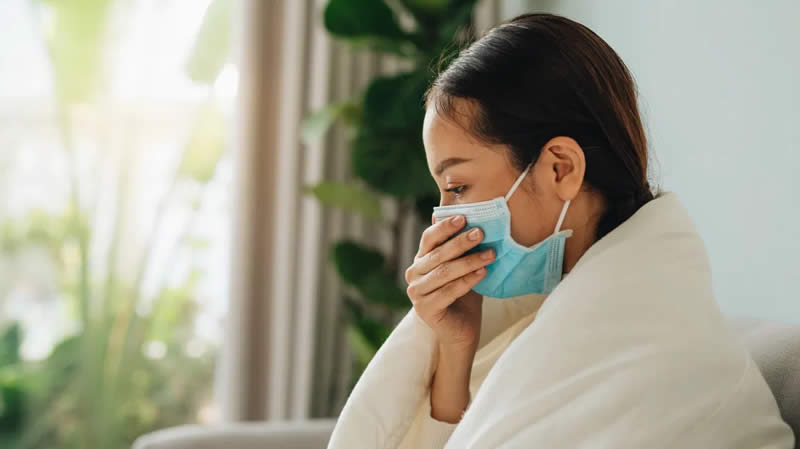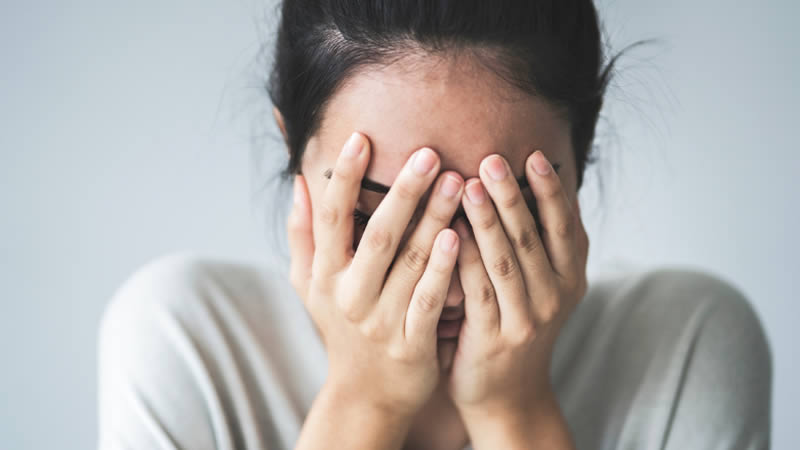More than 17 million people in the United States have been infected with the novel coronavirus, yet when you’re the one who hears the dreaded words, “You tested positive for COVID-19,” it can send you into a tailspin of stress and anxiety.
That’s what happened for Maureen Nally (her name has been changed), a teacher in New York. “When I found out I had COVID, my doctor reminded me that I’m relatively young and healthy and that the odds were good that I’d be OK—but that didn’t stop me from worrying about what kinds of symptoms I might have, whether I’d take a turn for the worse, and what the long-term impact might be,” says the 39-year-old mom of two. “Then, there was the immediate concern that my husband and daughters would test positive, too.”
When a rapid test showed Nally’s 5-year-old had COVID-19, she says she felt like she was on the verge of a total meltdown. “All logic goes out the window and everything just feels really scary,” says Nally. “On top of the emotional whirlwind, I felt physically terrible. I had a searing headache, body aches, an upset stomach, and felt more tired than I was when my kids were newborns.”
The psychological toll of testing positive for COVID-19
It’s never fun to be sick, but hearing you’ve got the novel coronavirus is uniquely stressful, says Craig Sawchuk, Ph.D., a clinical psychologist and co-chair of the Division of Integrated Behavioral health at the Mayo Clinic. “We’re living through a global pandemic with very serious consequences, and because we’ve been hearing about it for going on a year now and seeing images of very sick patients and overwhelmed healthcare providers, the mind quickly goes to worst-case scenarios,” he says. Couple that with the fact that we’ve all been relatively isolated—which itself promotes anxiety and depression—and it’s easy to see how a COVID positive test might send you reeling.
What’s more, there’s a lot of stigma around the virus—so much so that those who share the news that they tested positive can end up on the receiving end of judgmental reactions. Despite the fact that Nally is an elementary school teacher who had a known exposure through one of her students, she says she still had friends questioning where she went in the weeks leading up to her diagnosis, and whether she was compliant about wearing a face mask. Then, there were friends who brushed off her diagnosis as no big deal, even going so far as to call Nally “lucky” to get the time off from work. And the friends who pinged her constantly, wondering about their own kids’ exposure via being at school with Maureen’s kids, while not asking how she and her family were doing or if they could do anything to help.
“What I quickly learned is that there’s so much stigma and misinformation around this virus,” says Nally. “And none of that is helpful when you’re the one dealing with symptoms.”
How to mentally cope with a COVID-19 diagnosis
Here’s what can help you deal with the stress and anxiety that often comes along with a COVID-19 diagnosis.
Feel your feelings.
One of the first steps you can take that’ll help you navigate the range of emotions is to let all of your feelings surface, says Haley Neidich, LCSW, a psychotherapist in Tampa, Fla. “Pretending you’re not afraid may backfire, leaving you more stressed—which will put your nervous system on high alert, lower your immune system, and make healing even harder,” she says.
Call a friend or loved one and ask them to listen to your fears and just let you vent. Then, ask yourself what you need to start moving through those negative emotions. “While you don’t want to reject your emotional experience, you also don’t want to wallow in it for too long,” says Neidich.
Turn to your go-to de-stress strategies.
The anxiety and depression that often comes along with a COVID diagnosis can be especially dangerous for those with a history of mental health concerns, says Michelle M. Carcel, Psy.D., a licensed psychologist in La Jolla, Calif. If that’s you, it’s especially important to turn to the tried-and-true tactics that have worked for you in the past—whether it’s scheduling a virtual appointment with a therapist, carving out time to meditate, or getting out into nature if you feel up to it (even if that means taking a drive to a park and opening your windows to breathe in some fresh air).
“Whether you have a history of anxiety and depression or not, try to think about the things that make you feel better and start doing those things,” says Carcel. “Just remember that the tactics that promote health will work better in the long run than things like online shopping or drinking too much.”
Find a way to ground yourself in the present moment.
When it comes to COVID-19, it can be especially tempting to play out a number of what-if scenarios. After all, symptoms are all over the map and are so different from patient to patient, and there’s no way of predicting how your body will respond to the virus. Because of this, Carcel says it’s especially important to identify when your thoughts are speed-racing into any number of potential futures—and snap yourself back into the present.

“It’s in our nature to catastrophize, and this is especially true when it comes to a COVID-19 diagnosis,” she says. “And while future-tripping isn’t easy to change, the first step is knowing you’re doing it.”
If you notice your thoughts are lingering in the past (Ugh, if only I hadn’t come in contact with the virus) or future (What if I have to go to the hospital and end up on a ventilator?), try writing down what’s true right now, suggests Dr. Capchuk. “This is a great way to slow your thoughts,” he says. “It’s not that you have to deny bad things can happen. But focusing on what you currently know to be true can help your current state of mind.”
Create a sense of normalcy.
This may not be possible right away, especially if you’re dealing with severe symptoms. However, when you start to feel a little better, you might take a shower every morning, get dressed for the day, and complete a few tasks that make you feel productive, says Dr. Capchuk. For example, you might sort through that pile of magazines on your coffee table, make a list of healthy recipes you want to make when you feel like cooking again, or even clean up your e-mail inbox. “Not only will these things help the day go by, but they’ll give your brain something to focus on that’s not your anxiety about your illness,” he says.
Limit your social media scrolling.
While you may be tempted to pass your time looking at what your friends are up to, avoid going down the social media rabbit hole, says Carcel. Research has found the more time you spend on those sites and the more of them you visit, the more anxious and depressed you might feel. “The brain is old-school,” says Carcel. “The more you do things that slow the brain down, like reading a book, the easier it’ll be to tap into your relaxation response,” she says. “Even if you think you’re calm when you’re scrolling through social media, your brain is activated, and your nervous system is more likely to be in a state of fight-or-flight.”
Be discerning about how much you share.
A week after Lisa Liberati and her husband first got sick with COVID-19, the Atlanta-based photographer took her two kids to an empty park and posted about it on Instagram. “We drove to a number of parks until we found one where we were literally the only ones there, and we came in contact with nobody during our entire outing,” she says. “The kids were so cooped up and we had to get out—but the comments about how I was being reckless and should stay at home made me regret the post.”
It’s smart to be choosy when it comes to how you disclose your COVID-19 diagnosis—and who you’ll tell, says Neidich. Of course, you have to tell anyone you’ve come in contact with that you tested positive. But outside of that, “only share the news with people who you trust will be supportive,” she says. “And if you get an unhelpful response, it’s fine to say something like, ‘I’m trying to manage my stress right now as I heal from this virus, so I’m not interested in rehashing how I might’ve contracted it,’” says Neidich.
Ask for help—and say “yes” when it’s offered.
If you find it difficult to reach out with requests for support and to accept acts of kindness when they arrive, you’re not alone. “The sad truth is that asking for help is often deemed as weakness in our society,” says Carcel. “But the strongest among us are the ones who know when they need support and ask for it. Suffering in silence is the worst thing you can do.” It’s also important to remember how good it feels to take care of others, adds Neidich, and to let your people do the same for you.
If a friend or loved one has COVID-19 and you want to be supportive, consider just showing up with help—for example, drop off a bag of library books for the kids at the front door, or schedule a meal delivery one night and simply send a heads-up text about the timing—without asking if it’s needed. “Sometimes, the best way to help is to not ask permission first,” says Neidich.



